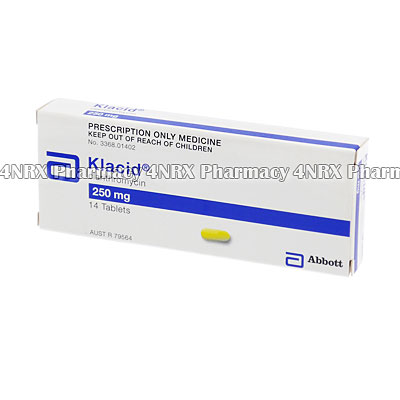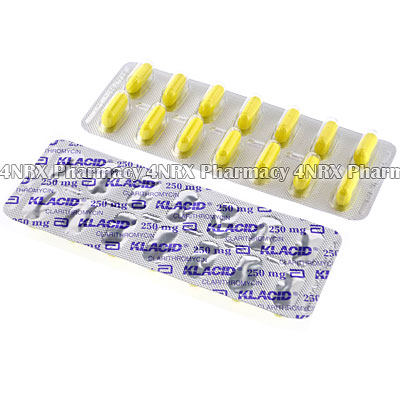 |
Home  Infection Infection  Klacid (Clarithromycin) Klacid (Clarithromycin) |
|
|||||||||
|
Klacid (Clarithromycin)
What is Klacid (Clarithromycin) used for? Klacid (Clarithromycin) is mainly used to treat bacterial infections of the respiratory tract. Common infections it has been proven effective in treating include pneumonia, tonsillitis, middle ear infections, bronchitis, and strep throat. It works by altering protein synthesis within the bacteria cells, preventing them from reproducing and the infection from spreading. This makes it easier for the body's immune system to naturally fight the infection. In addition to the uses listed above, some AIDS sufferers may use this medication to eliminate mycobacterium avium infections. How should I use Klacid (Clarithromycin)? Klacid (Clarithromycin) is typically prescribed to be taken twice daily at the dosage determined by the doctor. For best results, try to take the medication at evenly spaced intervals the same time each day. It can be taken with or without food along with a large glass of water. Do not alter the tablets prior to application by splitting, chewing, or dissolving their contents. This will prevent any alteration in their effects or destruction of the medicine. As with any antibiotic, it is important to complete the prescribed medication cycle of Klacid. Even if your symptoms seem to have disappeared, they could reappear more resistant to antibiotics. If you have any questions about your medication, ask your doctor to ensure the correct use. What are the side effects of Klacid (Clarithromycin)? Inform your doctor of all side effects you experience while taking Klacid (Clarithromycin). If any persist or worsen, consult your doctor promptly. Possible side effects can include:
Please Note Strictly use Klacid (Clarithromycin) as prescribed and follow all instructions provided by your doctor. Safe, suitable, and optimum dosage can vary and is dependent on the patient's health and medical history, as well as the condition you are treating. This medication may not be safe or suitable for all patients. Always ensure your doctor is informed if you are pregnant or breastfeeding, using any other type of medication (including non-prescription medicine, vitamins, and supplements), as well as if you have any allergies, other illnesses, or pre-existing medication conditions. Seek immediate medical attention or proceed to your nearest accident and emergency department if you suffer a hypersensitive or allergic reaction. Symptoms usually present during a reaction of this nature include difficulty breathing or swallowing, swelling of the limbs or face, tight chest, hives, and skin rashes. 

|
|||||||||||||||||